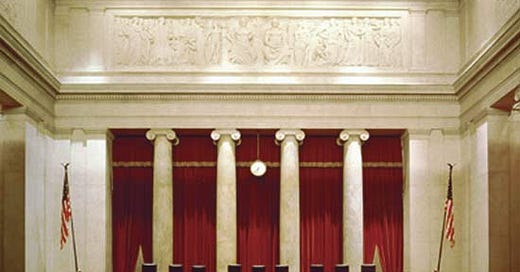Analysis: Supreme Court nominee Jackson’s record reveals clues about her environmental leanings
By Anthony Lacey
As confirmation hearings get underway Monday for U.S. Supreme Court nominee Judge Ketanji Brown Jackson, environmental advocates say her record provides a few clues as to how she might rule on key in energy and environmental cases as a justice.
The Senate Judiciary Committee is set to start the four-day nomination hearings for Jackson on Monday. If confirmed, she would be the first Black female Supreme Court justice.
Her nomination has drawn praise from major environmental groups including the League of Conservation Voters (LCV) Sierra Club, and Natural Resources Defense Council (NRDC). Each group has touted the “historic” nomination and called for the Senate to approve Jackson as the next justice, citing her career history as a federal judge as qualifying her for the role.
It is not clear if Jackson will face questions about her legal views on major environmental laws such as the Clean Air Act and Clean Water Act during the hearings, but both are currently issues pending in separate Supreme Court cases.
Jackson is currently a judge on the U.S. Court of Appeals for the District of Columbia Circuit, which deals with challenges to rules issued by the Environmental Protection Agency (EPA) and other federal agencies and departments. She previously served as a U.S. district court judge.
The nonprofit environmental group Earthjustice said in a recent statement that Jackson’s judicial record “reveals her ability to understand complex regulatory and statutory issues and appropriately apply the facts to the law.”
Earthjustice cited Government of Guam vs. United States of America, a 2018 opinion that Jackson wrote when she was on the D.C. district court. Her ruling allowed the unincorporated U.S. territory of Guam to proceed with a Comprehensive Environmental Response, Compensation and Liability Act (CERCLA) lawsuit that challenged the Navy over the dumping of toxic waste at a Guam landfill. The D.C. Circuit reversed this decision but the Supreme Court eventually sided unanimously with Guam and allowed the CERCLA challenge to continue.
The suit involved a complicated argument by the government that a previous Clean Water Act settlement precluded Guam’s challenge, but Jackson instead left the door open for Guam to push ahead with its effort to recoup $160 million in cleanup costs from the Navy.
Jackson’s other rulings on environmental matters reflect a mixed approach that makes it hard to extract a definitive judicial philosophy on those issues, however.
For example, in a 2019 ruling in Center for Biological Diversity (CBD), et al. v Department of Homeland Security (DHS), et al., Jackson rejected a legal challenge by CBD and other environmental groups over the Trump administration’s border wall construction efforts.
DHS sought to exclude the project from compliance with the National Environmental Policy Act, which requires federal projects to be assessed for their potential environmental impacts.
“This Court finds that Congress has spoken in no uncertain terms about the limits of judicial review when it comes to legal claims that challenge on non-constitutional grounds the DHS Secretary’s authority to waive otherwise-applicable legal requirements with respect to the construction of border barriers,” Jackson wrote in rejecting the plaintiffs’ challenge.
But while on the D.C. Circuit, Jackson has not written a ruling that directly the scope of the EPA’s regulatory authority under landmark environmental laws such as the Clean Air Act or Clean Water Act, making it hard to assess how she could rule as a justice in challenges to rules that the agency might issue in the future under those laws.
The scope of the EPA’s authority is at the center of a Supreme Court case in which the state of West Virginia and other challengers are urging the justices to rein in the agency’s power to regulate greenhouse gas emissions from power plants under the Clean Air Act. At a recent oral argument in the case, some conservative justices hinted at a desire to place some limits on that authority, although it remained unclear how the court could eventually rule in the litigation.
Some groups, like Sierra Club, aren’t waiting for any potential queries senators might ask at the hearings, and already urging to the Senate to swiftly confirm Jackson.
Jackson “will ensure equal justice for every single one of us, uphold the values of our Constitution and keep faith with the letter and spirit of the nation’s bedrock public health, environmental, civil rights, and labor laws,” Sierra Club said in a recent statement. “Judge Jackson has been confirmed by the Senate with bipartisan support three times in the past. She again must – and should – be swiftly confirmed by the Senate so that our country’s highest court will finally be one important step closer to representing and reflecting all Americans.”



